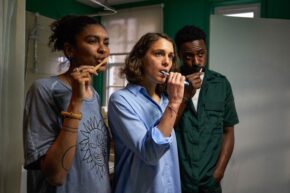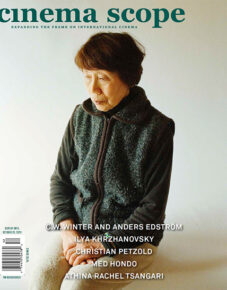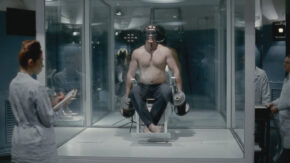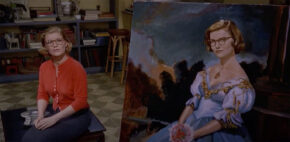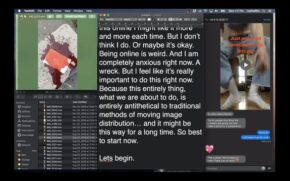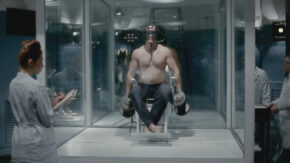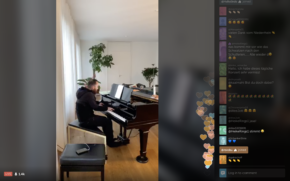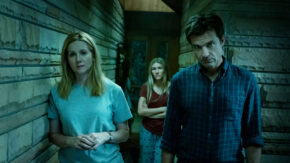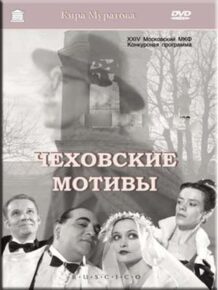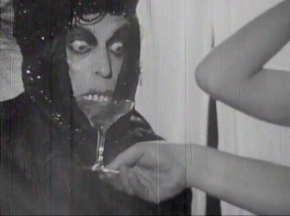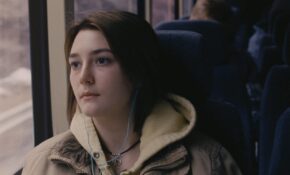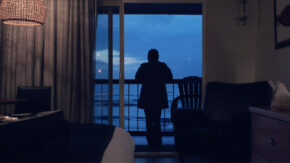CS83
The Math of Love Triangles: Athina Rachel Tsangari’s Trigonometry
By Adam Nayman | 07/04/2020 | CS83, From Cinema Scope Magazine, Interviews
The most arresting image in the new BBC Studios series Trigonometry (airing in the US this summer on HBO Max and in Canada on CBC Gem) comes in the fifth episode, when restaurateur Gemma (Thalissa Teixeira), in the middle of a difficult Nordic honeymoon getaway with her new husband Kieran (Gary Carr), goes on an evening field trip to see the Northern Lights. As Kieran sulks back at the hotel, she gazes up at a display that imbues the uncanny sensation—for the character, as well as the audience—of a planetarium-show special effect despite its you-are-there authenticity.
Read More → Cinema Scope 83 Table of Contents
By Cinema Scope | 06/23/2020 | CS83, From Cinema Scope Magazine, Table of Contents
Interviews The Land Demands Your Effort: C.W Winter (and Anders Edström) on The Works and Days (of Tayoko Shiojiri in the Shiotani Basin) by Mark Peranson DAU. Diary & Dialogue. Part One: A Living World by Jordan Cronk As If We Were Dreaming It: Christian Petzold’s Undine by James Lattimer The Math of Love Triangles: Athina…
Read More → The Land Demands Your Effort: C.W Winter (and Anders Edström) on The Works and Days (of Tayoko Shiojiri in the Shiotani Basin)
By Mark Peranson | 06/23/2020 | CS83, From Cinema Scope Magazine, Interviews
Though the process of watching the onset of life’s end yields gut-wrenching moments, some recorded, some reconstructed, it makes little sense to extract one scene from the whole picture, as the film’s ultimate strength lies in its refusal to privilege, well, anything: an image of a tree means as much as a visit to an onsen, three people walking in the dark, a farmer hoeing her land, or a black screen with no image at all, only an intricately composed soundscape (as the quote introducing the film reads, “Until the moment you are dead you can still hear”). Make no mistake: though mortality is front and centre, this is a salute to the possibilities provided by cinema, a celebration of life.
Read More → DAU. Diary & Dialogue. Part One: A Living World
By Jordan Cronk | 06/23/2020 | CS83, From Cinema Scope Magazine, Interviews
At the press conference for the premiere of DAU. Natasha at this year’s Berlinale, director Ilya Khrzhanovsky pre-empted questions regarding the controversial methods involved in the realization of his 14-year passion project—collectively known as DAU—by contrasting the experiences of his actors with the everyday lives of their Soviet-era characters. “All the feelings [depicted in the film] are real,” he said, “but the circumstances are not real in which these feelings happen.
Read More → In Search of the Female Gaze
By Erika Balsom | 06/23/2020 | CS83, Features, From Cinema Scope Magazine
The trope of a woman removing her glasses to suddenly reveal her great beauty is as familiar as it is eye-roll-inducing. She never looks that different, but her status as an erotic object changes immediately and immensely. A classic example is Dorothy Malone as a bookstore clerk in The Big Sleep (1946), but more recently there is Rachel Leigh Cook descending the stairs to the saccharine sounds of “Kiss Me” in She’s All That (1999). Give up your active gaze, this convention seems to say, and you will be alluring.
Read More → Live(stream) and In Person: Watching Zia Anger’s My First Film in the Age of Quarantine
By Jessica McGoff | 06/23/2020 | CS83, Features, From Cinema Scope Magazine
Zia Anger’s My First Film is a lot of things: a cinema-performance art hybrid, a confrontation with traditional modes of film production and distribution, a radical reclamation of the narrative regarding what it means to be a female artist, and, now, a livestream rather than a live performance.
Read More → Cinema Scope 83: Editors Note
By Mark Peranson | 06/23/2020 | Columns, CS83, From Cinema Scope Magazine
When the history of 2020 is written, if we make it that far, the disruption of the usual mechanisms of exhibition, production, and distribution of cinema will (rightly) appear as a footnote, and there’s nothing wrong with that. There are more important crises to manage, but here’s not the place to deal with them in any satisfying way. If the last issue appeared just as COVID-19 was locking us all indoors, this one is born as people are emerging onto the streets, not to head back to normalcy, but to express anger.
Read More → Film/Art | The People United Will Never Be Defeated: Igor Levit’s Hauskonzerts
By Shelly Kraicer | 06/23/2020 | Columns, CS83, Film - Art, From Cinema Scope Magazine
One usually looks to art galleries and film festivals for a sense of what’s on the avant-garde edge of sound-and-image art. For these pandemic-laden months, with galleries and cinemas shuttered, something extraordinary is happening in the most tradition-bound art, Western classical music—or Western art music, as I prefer to call it. It’s not just Levit, though he stands at the head of an astonishingly vital set of online streaming sessions. Events like Bang on a Can Marathon, Music Never Sleeps, and performers as disparate as the Berlin Philharmonic, veteran pianist Angela Hewitt, and young pianist Tiffany Poon are inventing pathways to experience, communally and distanced. All from an art form that has been declared dead long before the “death of cinema” became a thing.
Read More → TV or Not TV | Ozark’s America and the Rise of the Longform
By Robert Koehler | 06/23/2020 | Columns, CS83, From Cinema Scope Magazine
By Robert Koehler “Why do I have this feeling that it’d be better off if you were dead?” Ruth Langmore (Julia Garner) says this to Marty Byrde (Jason Bateman) in their first encounter inside a public-park washroom in Bill Dubuque and Mark Williams’ longform series, Ozark. As one of the notorious Langmores—a clan of (mostly)…
Read More → Global Discoveries on DVD | Diverse Kinds of Do-it-Yourself Subterfuge, Mainly American
By Jonathan Rosenbaum | 06/23/2020 | CS83, DVD Reviews, From Cinema Scope Magazine
Well before the coronavirus pandemic kicked in, I’d already started nurturing a hobby of creating my own viewing packages on my laptop. This mainly consists of finding unsubtitled movies I want to see, on YouTube or elsewhere, downloading them, tracking down English subtitles however and whenever I can find them, placing the films and subtitles into new folders, and then watching the results on my VLC player. The advantages of this process are obvious: not only free viewing, but another way of escaping the limitations of our cultural gatekeepers and commissars—e.g., critics and institutions associated with the New York Film Festival, the New York Times, and diverse film magazines (including this one), not to mention the distributors and programmers who pretend to know exactly what we want to see by dictating all our choices in advance.
Read More → Exploded View | No President (Jack Smith, 1967-1970)
By Chuck Stephens | 06/23/2020 | Columns, CS83, Exploded View, From Cinema Scope Magazine
White faces, black flesh, an enormous tusk, a bug-eyed succubus, holes in the plaster, acrid marihuana, vinyl exotica, a Christmas tree: these are the articles constituted. One nation, overexposed, with feather boas and liberation for all. Metamorphosis: tear gas wafts through the roses. And now here we are again, with the end of the Sixties just another Ludovico loop. But is the underground on top of things? At least, at last, No President (reconstituted by filmmaker Jerry Tartaglia) is on Vimeo. Hail to the grief.
Read More → Never Rarely Sometimes Always (Eliza Hittman, US)
By Courtney Duckworth | 06/23/2020 | CS83, Currency, From Cinema Scope Magazine
One May evening, I dipped into a Twitch stream in search of a fresh current. Within the weird undertow of quarantine, there is a new lustre to these live events, which mark unfixed days with a fixed hour—a dupe for the transient communion gone from cinemas that now lie empty. Some 200 of us “gathered” for a program, co-presented by Screen Slate and Electronic Arts Intermix, of short works from Cecelia Condit, a singular scrambler of feminine tropes and fairy tales since the ’80s. New to me among them was last year’s We Were Hardly More than Children, an oneiric memoir.
Read More → Blood Quantum (Jeff Barnaby, Canada)
By Mallory Andrews | 06/23/2020 | CS83, Currency, From Cinema Scope Magazine
The hook is intriguingly straightforward: in Blood Quantum, an infectious zombie disease spreads through the world, save for the residents of a Mi’kmaq community along the Québec-New Brunswick border who appear to be immune to the undeadly virus. In the post-apocalyptic remnants of their town, Sheriff Traylor (Michael Greyeyes) and his deputies guard the boundaries of their land against the violent hordes of “Zeds.”
Read More → There Can Be a Better World: The 2020 Images Festival
By Cayley James | 06/23/2020 | CS83, Festivals, From Cinema Scope Magazine, Web Only
In Toronto, where film festivals have become something of a cottage industry (with over 150 operating on an annual basis), it’s particularly hard not to feel the cruel irony of the present moment. Festivals remain one of the last holdouts for appreciating films in a public setting in the face of the steady march of streaming and VOD; now, they are faced with the stark choice of either postponing their events entirely, or, as with Images, pivoting to an online model that strikes at their very raison d’être.
Read More → 
